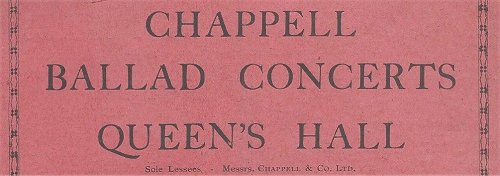
In January 1866, the first so called
Ballad Concert was held at St. James Hall in London. The experiment, which was hailed as a great success led to similar concerts being held thoughout the land. Initially these concerts consisted of contemporary ballad compositions written at the time, and often sponsored by sheet-music publishers such as Chappell.
As time went on earlier traditional songs were included, based on their intrinsic merit, their national origin, and their previous popularity. This is admirably summed by the reviewer in the Monthly Musical Record of 1871:
Mr Boosey (the music publisher) has been giving a new series of these highly popular entertainments, and by a judicious admixture in the programme of things new and old, as well as securing the services of many of our principal public performers, has made them thoroughly attractive. There are thousands who would never go to St James's Hall to hear a quartet or a sonata, that can thoroughly appreciate a good old song, and for this numerous class the Ballad Concerts supply exactly what they like.
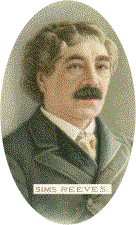
One of the most popular artists at these early concerts was John Sims Reeves who continued singing until the 1880's. The song
Come into the Garden Maude was written for him in 1857. However, his death in 1900 meant that he never recorded.
Once established, Ballad Concerts were held in both small and major concert Halls across the land, including the Royal Albert Hall. On the back of these public concerts, there was a hugh market for sheet music, which could be performed in the Drawing Room. Both the pianoforte, and sheet music itself were subject to major reductions in price in the late Victorian period. For a certain class of young lady it was expected that a reasonable standard of piano playing would be attained.
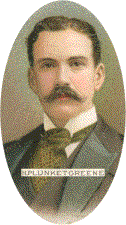
In the same way, as for Music Hall songs, it was soon found that a good writer and a composer together were not enough; it was also necessary to market the song by a proficient publisher, and to find the right performer to get the song over to the public. Harry Plunket Greene was one such singer. A lover of ballads and songs in English, he introduced many tradional and new songs into his concert programmes. Born in 1865, he made his first recordings in 1904 and is featured on the CD:
A Ballad Concert. He was heavily involved with the English song revival of the 1900's, and had songs dedicated to him by the composer Ralph Vaughan Williams.
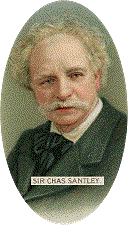
One aspect of the Concert business led to accusations of lowering the public taste. For some time the music publishers would pay a royalty on each copy of sheet music sold, in exchange for the particular artist singing the composition on every available occasion. Sir Charles Santley said
The public which renumerates the singer . . has a right to demand whatever will amuse it . . . I cannot enter into the question of public taste; being public property I have no right.
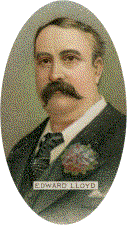
Edward Lloyd was happy to sing popular songs:
Why not popular songs? The people like them, and if the words have a good tone and the music is pleasing to the audience, why should I not sing them?
Differentiation between the Concert Platform and the Music Hall was twofold. Firstly ticket pricing ensured that only those with sufficient funds could attend the more prestigious Concert Halls as opposed to the cheaper Music Halls. Secondly, with the increase in the urban population, there was a need for public demonstrations of social standing. Whereas the Music Hall offered participation in the songs, the Concert platform was more suited to a quieter contemplation of the performance. Of course, the boundaries became blurred as the Music Hall moved more to Variety, and the Concert Hall suffered from over-enthusiastic calls for Encores from the performers. As the lines from
The Gondoliers state: "When everyone is somebodee, Then no one's anybody."
Boosey's Ballad Concerts ended in 1937, which approximates to the end of the popularity of English Ballads amongst the record buying public.

 One of the most popular artists at these early concerts was John Sims Reeves who continued singing until the 1880's. The song Come into the Garden Maude was written for him in 1857. However, his death in 1900 meant that he never recorded.
Once established, Ballad Concerts were held in both small and major concert Halls across the land, including the Royal Albert Hall. On the back of these public concerts, there was a hugh market for sheet music, which could be performed in the Drawing Room. Both the pianoforte, and sheet music itself were subject to major reductions in price in the late Victorian period. For a certain class of young lady it was expected that a reasonable standard of piano playing would be attained.
One of the most popular artists at these early concerts was John Sims Reeves who continued singing until the 1880's. The song Come into the Garden Maude was written for him in 1857. However, his death in 1900 meant that he never recorded.
Once established, Ballad Concerts were held in both small and major concert Halls across the land, including the Royal Albert Hall. On the back of these public concerts, there was a hugh market for sheet music, which could be performed in the Drawing Room. Both the pianoforte, and sheet music itself were subject to major reductions in price in the late Victorian period. For a certain class of young lady it was expected that a reasonable standard of piano playing would be attained.
 In the same way, as for Music Hall songs, it was soon found that a good writer and a composer together were not enough; it was also necessary to market the song by a proficient publisher, and to find the right performer to get the song over to the public. Harry Plunket Greene was one such singer. A lover of ballads and songs in English, he introduced many tradional and new songs into his concert programmes. Born in 1865, he made his first recordings in 1904 and is featured on the CD: A Ballad Concert. He was heavily involved with the English song revival of the 1900's, and had songs dedicated to him by the composer Ralph Vaughan Williams.
In the same way, as for Music Hall songs, it was soon found that a good writer and a composer together were not enough; it was also necessary to market the song by a proficient publisher, and to find the right performer to get the song over to the public. Harry Plunket Greene was one such singer. A lover of ballads and songs in English, he introduced many tradional and new songs into his concert programmes. Born in 1865, he made his first recordings in 1904 and is featured on the CD: A Ballad Concert. He was heavily involved with the English song revival of the 1900's, and had songs dedicated to him by the composer Ralph Vaughan Williams.
 One aspect of the Concert business led to accusations of lowering the public taste. For some time the music publishers would pay a royalty on each copy of sheet music sold, in exchange for the particular artist singing the composition on every available occasion. Sir Charles Santley said The public which renumerates the singer . . has a right to demand whatever will amuse it . . . I cannot enter into the question of public taste; being public property I have no right.
One aspect of the Concert business led to accusations of lowering the public taste. For some time the music publishers would pay a royalty on each copy of sheet music sold, in exchange for the particular artist singing the composition on every available occasion. Sir Charles Santley said The public which renumerates the singer . . has a right to demand whatever will amuse it . . . I cannot enter into the question of public taste; being public property I have no right.
 Edward Lloyd was happy to sing popular songs: Why not popular songs? The people like them, and if the words have a good tone and the music is pleasing to the audience, why should I not sing them?
Edward Lloyd was happy to sing popular songs: Why not popular songs? The people like them, and if the words have a good tone and the music is pleasing to the audience, why should I not sing them?